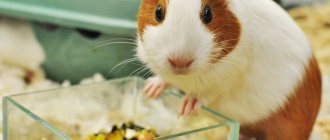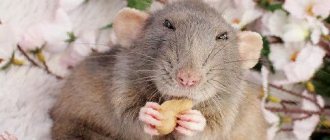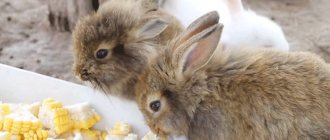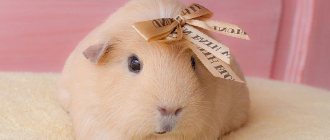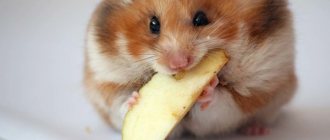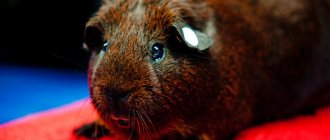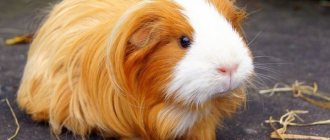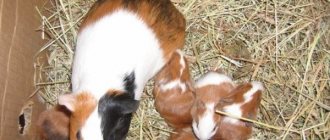During the season of ripening vegetables and fruits, you want to not only treat your pet with something tasty, but also provide its body with natural vitamins and minerals provided by nature itself. Guinea pigs are true connoisseurs of a variety of succulent foods. However, not all plant foods are suitable for feeding these wonderful rodents. In this article we will talk about whether guinea pigs can have watermelon and melon? How much and how often can animals be fed these sweet fruits without harm to their health?
What food to give your guinea pig
Guinea pigs eat a variety of foods and greens. According to the recommendations of experienced specialists, the pet’s diet should be varied and balanced. ½ of the total menu should be hay. The remaining 50% of the diet is dry food, succulent food and greens.
Dry food
Dry food includes grain crops and factory-produced granulated mixtures (special food for domestic guinea pigs).
Healthy grain feeds:
- millet;
- barley;
- sunflower seed;
- oats;
- corn grains.
Ready-made mixtures may contain vitamin complexes.
Grains should be in the guinea pig's diet every day and should always be freely available to the pet.
Hay and branches
Hay is the most useful and necessary product for guinea pigs. It improves the functioning of the digestive tract and prevents the development of intestinal diseases, and also helps to grind down the back teeth.
What kind of hay to give your pet:
- fresh, with a natural grassy smell;
- free from dust and other contaminants;
- small bundles (can be pre-cut or rolled into a roll);
- without coarse and large branches.
This food also needs to be given to your guinea pig every day. You can make hay yourself or purchase it ready-made in a store.
Green food
Another important product in the diet of domestic guinea pigs is green food. This is meadow or field grass grown in ecologically clean areas (away from polluted road areas).
Green herbs contain many useful and nutritious substances necessary for the healthy functioning of the body of guinea pigs. In addition, these animals happily eat fresh herbs, as well as equally healthy greens - spinach, dill, parsley, celery, lettuce, etc.
Healthy green food for guinea pigs:
- plantain leaves, dandelion;
- clover;
- cilantro;
- carrot tops;
- yarrow;
- chamomile, etc.
Juicy food
Juicy food for guinea pigs includes fruits and vegetables, as well as some berries, served to the pet as a tasty treat.
What juicy foods can you give:
- beets (fodder, red);
- fresh cucumbers;
- cauliflower and Brussels sprouts;
- carrot;
- Bell pepper;
- tubers and leaves of earthen pear;
- apples;
- garden sow thistle;
- corn cobs;
- zucchini;
- tomatoes;
- grapes (seedless only);
- pumpkin;
- green peas.
As a delicious dessert, you can sometimes pamper your pets with raspberries, wild strawberries, currants, strawberries and tangerines, which are rich in vitamin C.
Treats and vitamins
The body of guinea pigs especially needs vitamin C, so foods rich in ascorbic acid must be present in the daily diet of rodents. Salts and calcium are also important for them. To saturate the body with useful minerals, it is recommended to use special mineral stones from the store.
Healthy treats for guinea pigs:
- dried fruits;
- fruit slices;
- wheat bran;
- fresh cherry branches;
- mint;
- pea pods;
- peeled flax, sesame, pumpkin, sunflower seeds.
Hay
The most important food for guinea pigs. Hay not only normalizes the functioning of the intestinal tract, but is also an excellent tool for grinding down the incisors of rodents. Like grain, hay is sold at any pet store. When purchasing, it is important to carefully check that the dried grass is not affected by mold. Rotten and moldy hay can harm your pet's body. If the owner is engaged in the preparation of hay on his own, then he must carefully inspect the collected grass for the presence of prickly, weeds, and poisonous plants.
What to feed a pregnant guinea pig and newborn babies
Pregnant rodents need high-quality and nutritious nutrition. Rose hips, which are served to pets in the form of an infusion, are very beneficial for the body. You should also include wheat sprouts, beets and fresh carrots in your daily diet.
The diet of newborn pigs should contain foods rich in vitamins and proteins. For the first two weeks, babies feed on mother's milk. If it is missing, the owner will have to feed the small offspring; it is better to consult a veterinarian for advice.
Already from the second day of life, little guinea pigs begin to try different foods, so it is necessary to ensure that the cage contains:
- Juicy;
- Greens;
- Industrial feed.
Water
Every animal needs water and the guinea pig is no exception, although some breeders think differently, thinking that if the animal eats a lot of green grass, then it does not have such a need for water. But this opinion is not correct. All pigs need water, especially in hot weather and also for pregnant and lactating females. Fresh water should always be provided. It is better not to give a mug a drinking bowl, the water in it quickly becomes not fresh; for water it is better to take bottles - drinking bowls.
When it's hot outside, you can give the animals an open shelf so they can dip their paws in it. This cools the animal's body.
List of approved products
The diet of guinea pigs is based on foods such as vegetables, fruits, berries, garden and meadow greens, sunflower seeds, seeds, twigs of trees and shrubs.
Healthy and safe food for guinea pigs:
- Vegetables - cucumber, carrots, beets, pumpkin, fennel, zucchini, turnips, parsnips and celery in tubers. In small quantities you can treat your pet to bell peppers, tomatoes, artichokes, cauliflower, rutabaga, and Jerusalem artichoke.
- Fruits – seedless grapes, plums, apples, pears. Bananas, peaches, apricots, watermelon, melon, kiwi, pineapples, oranges and tangerines are served in small quantities.
- Berries - currants, raspberries, blueberries, cherries, sweet cherries, strawberries. In limited quantities - gooseberries, sea buckthorn, blackberries, cranberries, rowan.
- Garden greens - lettuce leaves, dill, celery, sprouted cereal grains, carrot tops, beets, corn cobs. In limited quantities - cilantro, spinach, parsley.
- Meadow greens - nettle, clover, yarrow, alfalfa, plantain, sage, echinacea, burdock, chamomile. Milk thistle, coltsfoot, dandelion, St. John's wort, wormwood, and fireweed are served in small quantities.
- Flax seeds are useful. In limited quantities - sesame seeds, dill, pumpkin and sunflower seeds.
- Useful branches of bushes and trees - birch, mulberry, hazel, pear, raspberry, ash, hawthorn, blueberry, maple and cherry plum. Sometimes you can pamper your pet with branches of chestnut, cherry, aspen, apricot, cherry, willow, poplar and rowan.
- It is not often that a rodent can be fed green peas and asparagus in small quantities.
Fruits and berries
Can guinea pigs have bananas? A banana rich in potassium will benefit your guinea pig, but you should not give more than 1 piece per day.
The peel of the vegetable must be removed, as it is treated with substances hazardous to health (wax, chemicals, ethylene and pesticides). For safety, it is better to remove soft fibers from the fruit.
Can guinea pigs eat a pear?
Pears can be given with the peel, but without the seeds. The fruit is washed well and cut into pieces; the pig should be offered water along with it. Excessive consumption of pears due to their high sugar content can cause diarrhea.
Can guinea pigs eat kiwi?
Kiwi is a very healthy fruit for animals. It contains a large amount of ascorbic and folic acids. It is also rich in vitamins E, iron, calcium, magnesium and phosphorus.
Kiwi is given without skin in the form of small pieces. For your pet, you need to choose harder fruits. It is better to control the amount you eat. An increase in the dose of kiwi is permissible in autumn and winter, as well as when feeding females during pregnancy and lactation.
Can guinea pigs have oranges and other citrus fruits?
Can be used occasionally. But it is better for guinea pigs to get vitamin C from other foods, avoiding citrus fruits. Possible complications:
- oversaturation with vitamins; skin irritation; oxidation of urine.
Can guinea pigs eat apples?
Apples can be raw or dried. They have a balanced ratio of sugar and fructose (18:80%). It allows the pig to be active.
The fruit must be peeled and cut into slices. It is better not to give more than 3 pieces at a time.
Can guinea pigs eat strawberries, grapes and other berries?
Strawberries contain a sufficient amount of vitamin C to pay attention to the berry when choosing a treat for a rodent. You can also give strawberry leaves to animals.
- The pig might like grapes. You can offer the animal seedless grapes. Eating currants once a week will also not harm your pet. If you do not abuse it, you can offer the pig berries and raspberry leaves, berries, leaves and branches of blueberries, blackberries and sea buckthorn, and rose hips without seeds. Cranberries are given for medicinal purposes. It has an anti-inflammatory effect on the mucous membranes of the mouth, stomach, and bladder.
What not to feed a guinea pig
There is a list of harmful foods that you should absolutely not feed to your pet guinea pig. They are absolutely useless for their body, and some of them can cause serious health problems.
What not to give to rodents:
- Prohibited vegetables: radish, radish, onion, potato, eggplant, garlic, horseradish.
- Harmful fruits: dates, persimmons, lemon, lime, pomegranates and grapefruits.
- Do not feed your pet sorrel, rhubarb greens, green onions, garlic, as well as lavender, motherwort, celandine, belladonna, serpentine, valerian, wild rosemary, fern, sow thistle and hemp seeds.
- Branches of fir, quince, oak, pine and spruce are prohibited for rodent food.
- Beans and boiled peas should not be given as legume products.
- Meat and dairy products, eggs, sweets and baked goods are prohibited in any form.
It is also unacceptable to give guinea pigs food from your table, low-quality food, spoiled and stale food, indoor greens, canned food, spices, mushrooms and fruit seeds.
Jerusalem artichoke
The entire Jerusalem artichoke plant, leaves, flowers, roots, is edible for guinea pigs. Jerusalem artichoke contains a large amount of fiber and essential amino acids - lysine, leicine, arginine. Root vegetables contain inulin, a natural analogue of insulin, which is why Jerusalem artichoke is recommended for those prone to diabetes. But root vegetables should not be given to marine animals often, since they are considered concentrated feed, and young tubers contain poorly digestible starch, which can cause intestinal disorders.
Guinea pig diet
Cereals and pelleted feeds
This type of diet is based on grain crops and ready-made food, containing all the necessary vitamins and mineral supplements for the healthy growth and development of a domestic rodent.
Nutrition Features:
- You need to buy only high-quality food from trusted manufacturers for your guinea pig. Cheap food contains many harmful and unnatural ingredients that can cause serious health problems.
- Dry food must be supplemented with moist, juicy food.
- Clean drinking water should always be freely available to your pet.
- It is not advisable to feed high-calorie foods to inactive rodents.
Advantages of nutrition: ready-made food has a solid structure, which helps the animal grind its teeth, convenient use of food, no need to prepare special food for the rodent.
Disadvantages: you need to constantly purchase food for your pet and always have a certain supply of it in the house.
On our store’s website you can select and buy high-quality industrial food for domestic guinea pigs from reliable global manufacturers. The range includes cozy cages for rodents, comfortable drinking bowls, special toilets with nozzles, various accessories for games and much more.
Guinea pig feeding
Guinea pigs need to be fed correctly, avoiding overeating and obesity of the pet. The serving quantity is determined by the type of diet and the age of the animal.
Quantity and quality of food
The amount of daily serving of grain-free food is up to 30% of the pet’s total body weight. After feeding, food is removed from the cage. Only hay and young branches of bushes or trees can be left freely available.
One serving of grain food for an adult pet is 1/2 tablespoon. In addition to dry food, you can pamper your rodent with small amounts of pieces of fruit and vegetables.
All food served to a pet rodent must be fresh and of high quality. Under no circumstances should you give your pet spoiled vegetables or fruits. Such food can cause serious poisoning.
The feed dosage is doubled when feeding pregnant guinea pigs. You need to introduce more juicy and green foods into your diet, rich in healthy vitamins and mineral complexes.
How many times a day should you feed your guinea pig?
Grain feeding is served no more than 2 times a day. It is advisable to follow a feeding schedule and give food at the same time. Uneaten dry food may remain in your pet's feeder all the time.
Water
Clean drinking water should always be in your pet rodent's drinking bowl. An adult pet can drink up to 250 ml of liquid per day. Pregnant guinea pigs drink even more water.
Pet rodents should be given filtered or bottled clean water. For convenient and safe storage of liquid in a cage, it is recommended to use a special closed drinking bowl that does not contain dust or other debris. Pathogenic microorganisms that are unsafe for the animal’s body can multiply in contaminated water.
Guinea pigs should not be given any sweet, carbonated or dairy drinks. You can only give your pet regular water and not boiled water!

